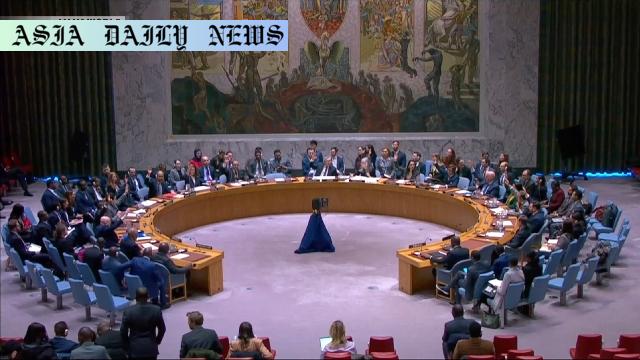M23 Rebels: The UN Security Council has ordered a ceasefire, urging Rwanda to halt its involvement and assisting efforts for peace in the DRC.
UN Security Council calls for immediate ceasefire in the DRC.
Accusations of Rwanda supporting M23 rebels with demands for withdrawal.
Concerns voiced over advancing M23 forces and their potential move to Kinshasa.
Widespread human rights abuses, including sexual violence and child recruitment, reported in conflict zones.

Introduction: UN’s Call for Peace
The United Nations Security Council has made a decisive and urgent call, demanding an immediate ceasefire in the Democratic Republic of the Congo (DRC). This resolution, adopted unanimously, takes a strong stance against the escalating violence in the central African nation, aimed particularly at the notorious M23 rebel group. Recent developments have seen M23 forces rapidly expand their control, raising alarm among international actors and citizens alike. The resolution also includes a firm mandate for Rwanda to end its alleged support of the M23 rebels and to withdraw any forces from DRC territory unconditionally.
The Advance of the M23 Rebel Forces
The eastern DRC is witnessing a severe humanitarian crisis as the M23 rebel group continues its advance, seizing significant territories including Bukavu, one of the region’s major cities. Reports indicate that the rebels are positioning themselves for further advancements, with concerns over intentions to reach the nation’s capital, Kinshasa. This has escalated fears of a broader regional conflict, potentially involving neighboring nations and destabilizing the already fragile central African region.
Humanitarian Concerns and Violations
UN special representative in the DRC, Bintou Keita, emphasized the grave human rights violations taking place amidst the conflict. Civilians in the eastern DRC are enduring an “intolerable degree of suffering,” with numerous reports of harassment, sexual violence, killings, and forced child recruitment. Women, girls, and young people remain disproportionately affected by the violence, compounding the already dire situation in affected regions.
International and Regional Implications
The rapid territorial gains of the M23 rebels and their potential to destabilize the DRC further have raised red flags across the international community. The risk of the conflict expanding into a regional war remains a pressing concern. Neighboring countries, especially Rwanda, are under increasing scrutiny from the UN and other actors, with growing evidence of their involvement in supporting the rebels. Such involvement could lead to further sanctions and diplomatic tensions in the region.
Role of Peacekeeping Missions
UN peacekeepers and African Union forces are currently providing support to the DRC government in its struggle against the M23 rebels. Despite these efforts, the rapid advancements by the rebel group highlight the challenges faced by peacekeeping forces in ensuring stability and protecting civilians. The continued presence and effectiveness of these missions are critical for providing humanitarian aid and maintaining some semblance of order in the midst of chaos.
Next Steps for Global Leaders
The UN Security Council resolution serves as a critical starting point for addressing the crisis. However, much work remains to be done on both political and humanitarian fronts. Diplomatic efforts must intensify to pressure Rwanda and prevent further escalation, while humanitarian agencies need greater support to address the unfolding human rights crisis. Global leaders face the urgent task of balancing swift action with long-term solutions to bring peace to the DRC.
Conclusion: A Call to Action
As the DRC faces one of its most challenging periods, the international community must unite in addressing the threats posed by the M23 rebels and their support networks. Collaborative efforts are essential not only to prevent further violence but also to provide relief to affected populations and create a pathway to sustainable peace in the region.
Commentary
The Need for Global Solidarity
The situation in the Democratic Republic of the Congo is a stark reminder of the complexities and challenges that come with ensuring peace and stability in conflict-prone regions. The international community, led by the United Nations, has taken a commendable step in addressing the immediate threats of violence by the M23 rebels. However, this effort must not stop at resolutions and demands.
The Tragic Impact on Civilians
One of the most heartbreaking aspects of this conflict is the suffering of civilians, particularly vulnerable groups such as women and children. The reported cases of sexual violence, forced recruitment of minors, and targeted killings are both shocking and unacceptable. It is imperative to hold the perpetrators accountable and ensure justice for the victims.
A Call for Regional and Global Action
The allegations of Rwanda’s involvement in supporting the M23 rebels highlight the regional dimensions of this conflict. It is crucial for neighboring countries to step back from actions that may escalate tensions and instead work collaboratively towards resolving the crisis. Global powers must also lend their influence to foster dialogue and peacebuilding efforts among the warring factions.
Long-Term Solutions Beyond Ceasefire
While the immediate goal of a ceasefire is critical, the path to lasting peace lies in addressing the root causes of the conflict. Economic inequality, governance challenges, and exploitation of natural resources continue to fuel instability in the DRC. International aid and investment in development projects can play a pivotal role in helping the DRC rebuild and prevent future conflicts.


